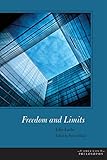Freedom and Limits / John Lachs; ed. by Patrick Shade.
Material type: TextSeries: American PhilosophyPublisher: New York, NY : Fordham University Press, [2014]Copyright date: ©2014Description: 1 online resource (520 p.)Content type:
TextSeries: American PhilosophyPublisher: New York, NY : Fordham University Press, [2014]Copyright date: ©2014Description: 1 online resource (520 p.)Content type: - 9780823256754
- 9780823257935
- 128 23
- BD31 .L28 2014eb
- online - DeGruyter
| Item type | Current library | Call number | URL | Status | Notes | Barcode | |
|---|---|---|---|---|---|---|---|
 eBook
eBook
|
Biblioteca "Angelicum" Pont. Univ. S.Tommaso d'Aquino Nuvola online | online - DeGruyter (Browse shelf(Opens below)) | Online access | Not for loan (Accesso limitato) | Accesso per gli utenti autorizzati / Access for authorized users | (dgr)9780823257935 |
Browsing Biblioteca "Angelicum" Pont. Univ. S.Tommaso d'Aquino shelves, Shelving location: Nuvola online Close shelf browser (Hides shelf browser)

|

|

|

|

|

|

|
||
| online - DeGruyter Imagined Sovereignties : Toward a New Political Romanticism / | online - DeGruyter Eddic, Skaldic, and Beyond : Poetic Variety in Medieval Iceland and Norway / | online - DeGruyter At Freedom's Limit : Islam and the Postcolonial Predicament / | online - DeGruyter Freedom and Limits / | online - DeGruyter Art and Morality : Essays in the Spirit of George Santayana / | online - DeGruyter Italoamericana : The Literature of the Great Migration, 1880-1943 / | online - DeGruyter Sabato Rodia's Towers in Watts : Art, Migrations, Development / |
Frontmatter -- Contents -- List of Abbreviations -- Acknowledgments -- Introduction -- Prologue -- Part I: Mind and Reality -- 1 The Impotent Mind -- 2 Santayana’s Philosophy of Mind -- 3 Fichte’s Idealism -- 4 Peirce, Santayana, and the Large Facts -- 5 The Transcendence of Materialism and Idealism in American Thought -- 6 Primitive Naturalism -- Part II: Self and Society -- 7 Two Views of Happiness in Mill -- 8 Questions of Life and Death -- 9 On Selling Organs -- 10 A Community of Psyches -- 11 The Cost of Community -- 12 Public Benefit, Private Cost -- 13 Leaving Others Alone -- Part III: Pluralism and Choice-Inclusive Facts -- 14 Relativism and Its Benefits -- 15 The Element of Choice in Criteria of Death -- 16 Human Natures -- 17 Persons and Different Kinds of Persons -- 18 Grand Dreams of Perfect People -- 19 Philosophical Pluralism -- Part IV: Meaningful Living -- 20 To Have and to Be -- 21 Drugs: Th e Fallacy of Avoidable Consequences -- 22 Loving Life -- 23 Aristotle and Dewey on the Rat Race -- 24 Improving Life -- 25 Stoic Pragmatism -- 26 Pragmatism and Death -- Part V: Human Advance and Finite Obligation -- 27 The Relevance of Philosophy to Life -- 28 Both Better Off and Better -- 29 Education in the Twenty- First Century (with Shirley M. Lachs) -- 30 Learning About Possibility -- 31 Moral Holidays -- 32 Good Enough -- Epilogue -- Notes -- Further Reading -- Index
restricted access online access with authorization star
http://purl.org/coar/access_right/c_16ec
Freedom and Limits is a defense of the value of freedom in the context of human finitude. A contribution to the American tradition of philosophy, it focuses attention on moral problems as we encounter them in daily life, where the search for perfection and the incessant drive to meet obligations make it difficult to attain satisfaction. The book argues that uniformity is unproductive: Human natures are varied and changeable, making the effort to impose a unitary good on everyone futile. Moreover, we don’t need to strive for more than what is good enough: Finite achievements should be adequate to satisfy finite people.The ultimate aim of the book is to reclaim the role of philosophy as a guide to life. In doing so, it presents discussions of such important philosophers as Fichte, Hegel, Peirce, Dewey, James, and, above all, Santayana.
Mode of access: Internet via World Wide Web.
In English.
Description based on online resource; title from PDF title page (publisher's Web site, viewed 03. Jan 2023)


